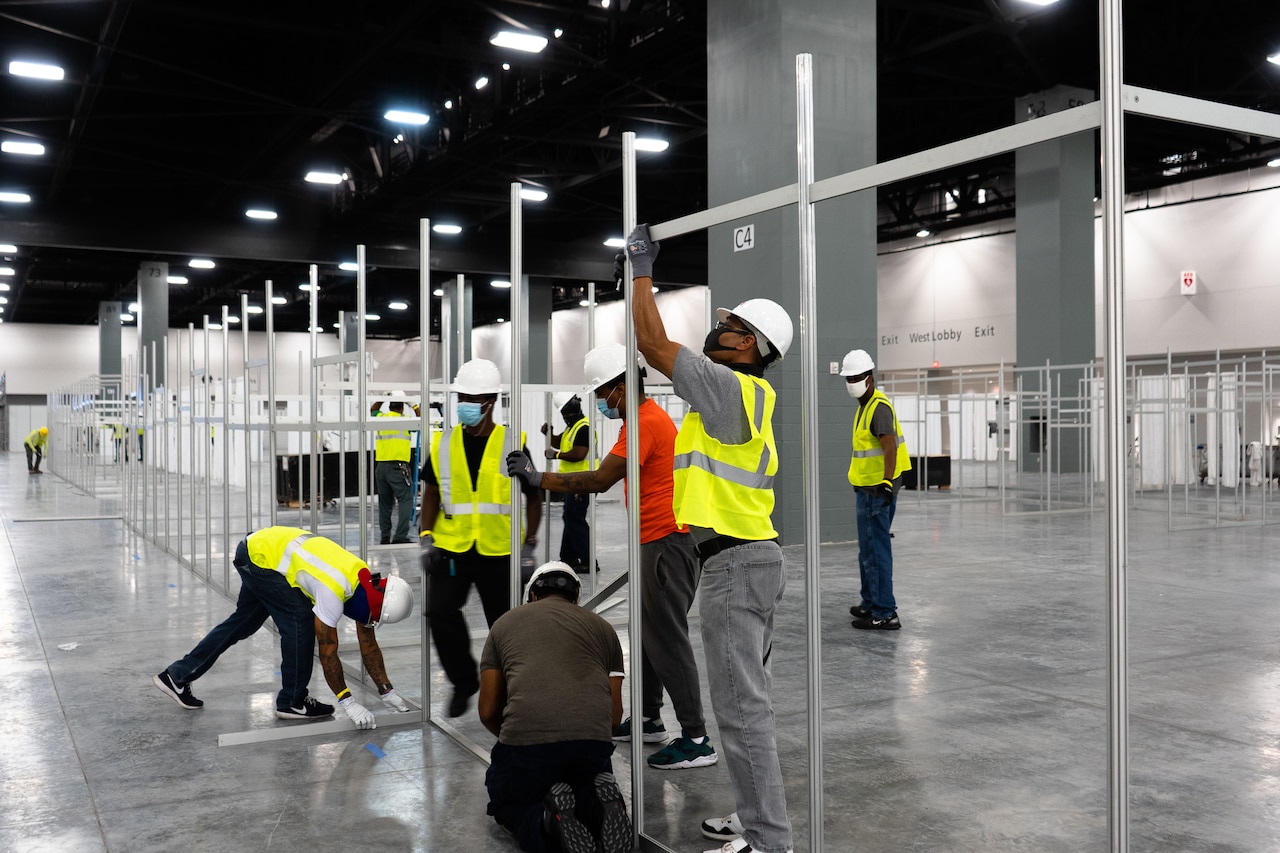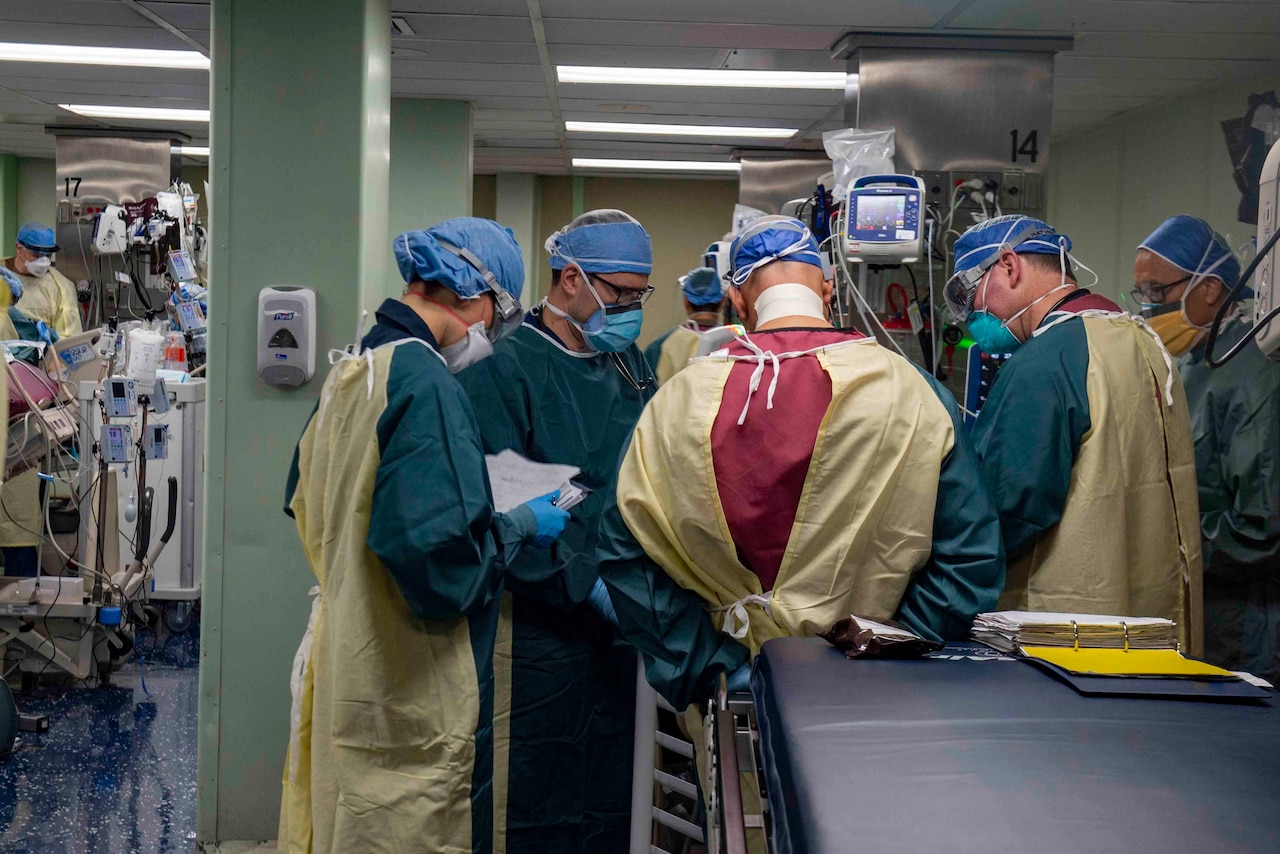April 24, 2020 | BY James Yocum
In February, residents of Miami Beach, Florida, weren’t
thinking about global pandemics. They were thinking about the 80,000 visitors
flooding the Miami Beach Convention Center for the NFL Experience and Super
Bowl LIV.
A lot can change in two months. Billboards on I-95 still
hype the big game held Feb. 2, but ever since the governor issued his
"Safer at Home" order, there haven't been many drivers on the road to
see them.
The Miami Beach Convention Center has changed a lot in that
time, too. Just two years after receiving a $620 million makeover, the center
will not be hosting Super Bowl fans, car shows or boat shows for a while.
Instead, it will be part of a federal, state, county and local government
response to build enough hospital beds to support local hospitals and avoid a
medical system collapse during the COVID-19 pandemic.
"We've been in the Miami area looking at different
places we could build alternate care facilities since mid-March," said
Army Lt. Col. Todd Polk, the Army Corps of Engineers Jacksonville District's
deputy commander for South Florida. "Having teams in the field early
really paid off. By the first week in April, we had our assignment and shipped
a team down to the Miami Beach Convention Center to begin construction."
The Corps of Engineers jumped into action after the Federal
Emergency Management Agency issued the mission to begin converting the
convention center April 4. District contract officers awarded the work to
Robins and Morton Group just two days later, with construction beginning the
next day.
"The initial requirements were not even completely
ready," said Army Col. Andrew Kelly, the Corps of Engineers Jacksonville
District commander. "We often use the analogy of building an airplane
while we fly it a lot, but it was really true in this case. We were making
multiple changes to the plan every day for the first week of construction.
Crews were working 24 hours a day, so we would make a decision to change
something and the contractor was executing it immediately."
The overall mission was pretty daunting: Turn 246,000 square
feet of open space into a 450-bed facility with the equipment needed to treat
COVID-19 patients. This would include the construction of an on-site pharmacy
and laboratory, dedicated nursing stations, medical command center and
administrative spaces, two cafeterias, ambulance staging area, isolated patient
intake and miles of copper tubing, electrical cables and CAT 6 data transfer
cables to support medical operations 24/7.
All of this was scheduled for completion by April 27. But
the state didn't have until April 27. On the second day of construction,
Florida Gov. Ron D. DeSantis visited the site and met with Army Lt. Gen. Todd
Semonite, the Corps of Engineers commander and chief of engineers.
"The governor just sat with me in the trailer behind us
and said 'You've got until the night of the 20th of April,'" Semonite said
during the news conference that followed. "There’s no time to design and
build it. We have a suspense, and we have to get it done."
That put the pressure on the Jacksonville District team and
the contractor, Polk said.
"Instead of three weeks, we had two," he said.
"We were already looking at 24-hour shifts and a tight deadline. Add in
the complication of requirements being refined in real time and the difficulty
everyone in the nation is facing when ordering the medical equipment, and what
was a hard assignment became one of the most challenging we've ever
faced."
So what did the Jacksonville District do when facing a
shortened deadline and a Herculean task? It delivered the facility ahead of
schedule, with construction being completed April 18 and the keys handed to the
Florida Division of Emergency Management on April 19.
A lot of factors were involved in the success, Kelly said.
National support from the Corps of Engineers on supply chains, enough funding,
a willing partnership with the city and county government, and a dedicated team
on the ground working with the contractor. But the factor that really stood out
was the way the state worked to provide the requirements needed to complete
construction, he added.
"The biggest concern I had was being able to make the
decisions that needed to be made at the right time," Kelly said.
"Tallahassee gave us exactly what we needed. They were able to say what we
should do, what needed to adjust in the plans, and make rapid and effective
decisions. It was immeasurable for those of us out here daily on the site to
not have to wait for a decision."
The Jacksonville District also benefited from the expertise
of the Florida National Guard for advice during the build.
"The partnership the Florida National Guard established
with the Army Corps of Engineers during the construction of the Miami Beach
alternate care facility has been exceptional," said Army Col. Ricardo
Roig, the commander of the Florida National Guard's Task Force 50th. "We
are grateful for the Corps' hard work getting this facility completed, and are
working with our state partners to provide all necessary support to ensure it
is ready to operate."
As the owner of the convention center, the city of Miami
Beach was also largely responsible in completing the project early, Kelly said.
The city's cooperation was especially important, considering that the alternate
care facility was designed to provide flexibility to local medical systems in
response to COVID-19.
"We are grateful to the Army Corps of Engineers for
swiftly constructing the alternate care facility at our Convention Center — a
precaution to assure that we are fully prepared for a worst-case scenario and
that our community will never face shortages of beds or equipment," Miami
Beach Mayor Dan Gelber said. "Hopefully, it won't ever be occupied."
(James Yocum is assigned to the Army Corps of Engineers.)









